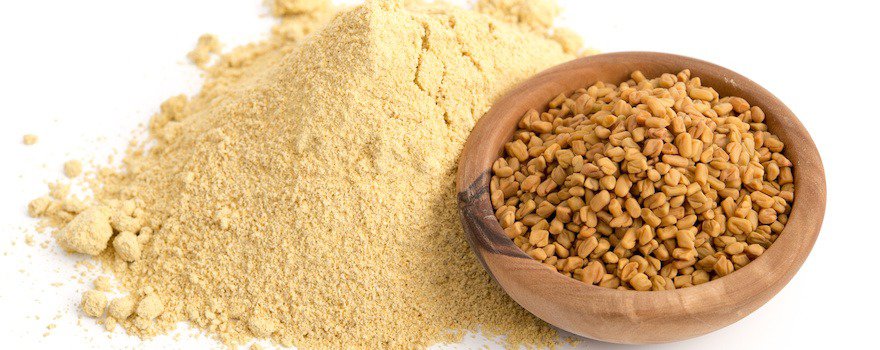Fenugreek to help regain appetite and gain weight
A revered seed in India and Maghreb
Fenugreek has been used since antiquity for its medicinal and culinary properties. It is part of many spice mixes from the Orient, like curry or ras-el-hanout. Originating from North Africa, evidence of its use dates back to 1500 BC in an Egyptian papyrus mentioning it for treating burns.
This small triangular seed also holds a prominent place in Ayurvedic medicine (traditional Indian medicine) and traditional Chinese medicine. These recommend it as a tonic, to fight against diabetes, and to treat inflammations and infections of the body.

Fenugreek is indeed a potent tonic. Traditionally, it’s recommended for women post-childbirth, convalescents, or those experiencing extreme fatigue.
A rich and powerful food
Fenugreek seeds are very interesting from a nutritional standpoint. They are particularly rich in proteins, iron (20% of the recommended daily intake), and fiber. Some molecules in fenugreek, like saponins, naturally stimulate the appetite.
Fenugreek for gaining weight: how, why?
Asthenia or loss of appetite: a lesser-known issue
There are several reasons one might wish to gain weight or regain appetite:
- In case of eating disorders, notably anorexia;
- In cases of medical treatments causing a loss of appetite;
- During depression, anxiety, or stress (appetite is intermittently or permanently reduced);
- If one naturally tends to lose weight or eat very little and wants to gain weight;
- For athletes, to gain muscle mass and improve performance.
Gaining weight sustainably and healthily is not that easy. Overconsumption of fatty products is not a solution as it may cause other health issues. Moreover, those with eating disorders can quickly switch from anorexia to bulimia without consistently regulating appetite and weight gain.
Read also | Our tips for choosing fenugreek well
That’s why appetite-stimulating plants like fenugreek are important for gaining weight naturally and “healthily.”
Fenugreek, a food recognized for naturally gaining weight

Populations in the Maghreb traditionally use fenugreek to gain weight, especially women to gain more curves (for example, to increase breast size). It is also administered to babies considered too thin to help them gain weight. Scientists have verified this traditional property of fenugreek. In 1990, Commission E (a German agency of phytotherapy experts) recognized the effectiveness of fenugreek in stimulating appetite.
Fenugreek therefore possesses appetite-stimulating properties, allowing it to open the appetite, but also to regulate it. Its fiber richness also makes fenugreek a natural appetite suppressant.
Consuming fenugreek will therefore allow one to eat adequately to gain weight and strength, but also to avoid consuming too many fatty foods. A study conducted in 2009 showed that regular consumption of fenugreek allowed a 17% reduction in fatty food intake among the participants.
Buying organic fenugreek: my selection
Consuming fenugreek to gain weight
Fenugreek dosage
Fenugreek can be consumed in different ways: eating the whole seed or as a powder, in the form of a dietary supplement, or externally with fenugreek oil.
One can preferably buy whole fenugreek seeds in organic stores and grind them into powder to sprinkle into dishes (1/2 teaspoon for 2 people) or consume them as a therapeutic drink (fenugreek tea). It is also possible to soak fenugreek seeds to soften them, making them easier to eat.
There are also fenugreek powder capsules that can be consumed as a one-month cure. It is generally advised to take six capsules per day, but specialist advice is necessary before starting a fenugreek cure to gain weight.
Fenugreek is a seed that can be consumed freely without major side effects. However, pregnant women are advised not to consume large amounts due to the risk of contractions it may cause. Furthermore, excessive consumption of fenugreek can lead to temporary digestive issues (bloating, irritation).
Fenugreek oil can also be used externally on targeted areas, such as the chest, to firm up the skin and increase volume.
Fenugreek, a complement to a rich and balanced diet for gaining weight
Of course, consuming only fenugreek without changing dietary habits will not allow for sustained weight gain.
Fenugreek should be combined with a healthy lifestyle and a diet rich in starches to “gain” weight properly.
Adopt a varied diet to gain weight harmoniously and without health risks. Prioritize starchy foods (pasta, rice, semolina…) and legumes (lentils, chickpeas…), rich in complex carbohydrates, to gain weight and absorb “good” calories.

Take inspiration from Indian, Mediterranean, and Eastern gastronomy to create dishes rich in flavors and nutrients: couscous, vegetable curries, cereal or legume balls (falafels…), to gain weight “healthily” while enjoying yourself. All topped with a good dose of fenugreek of course!



